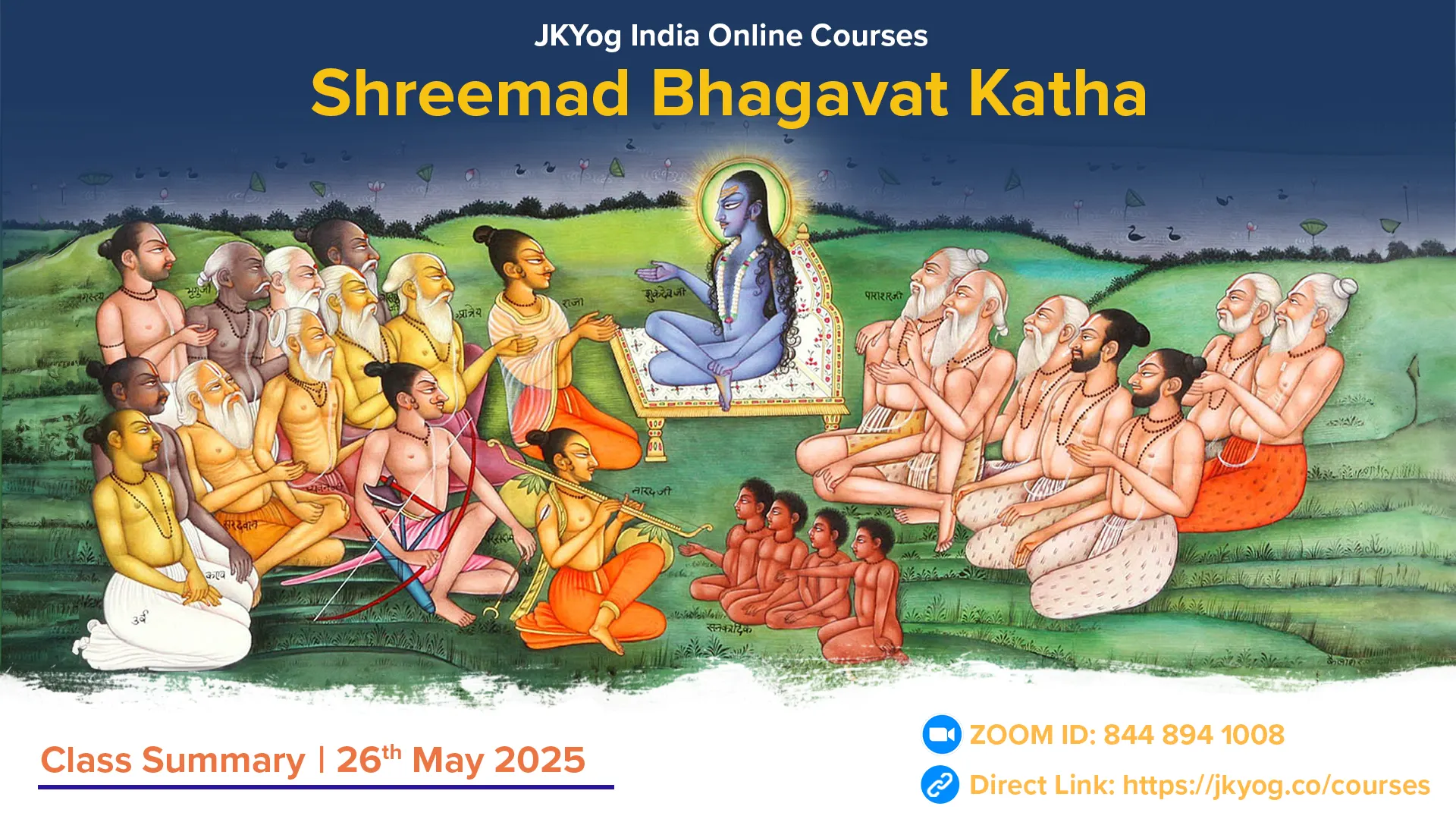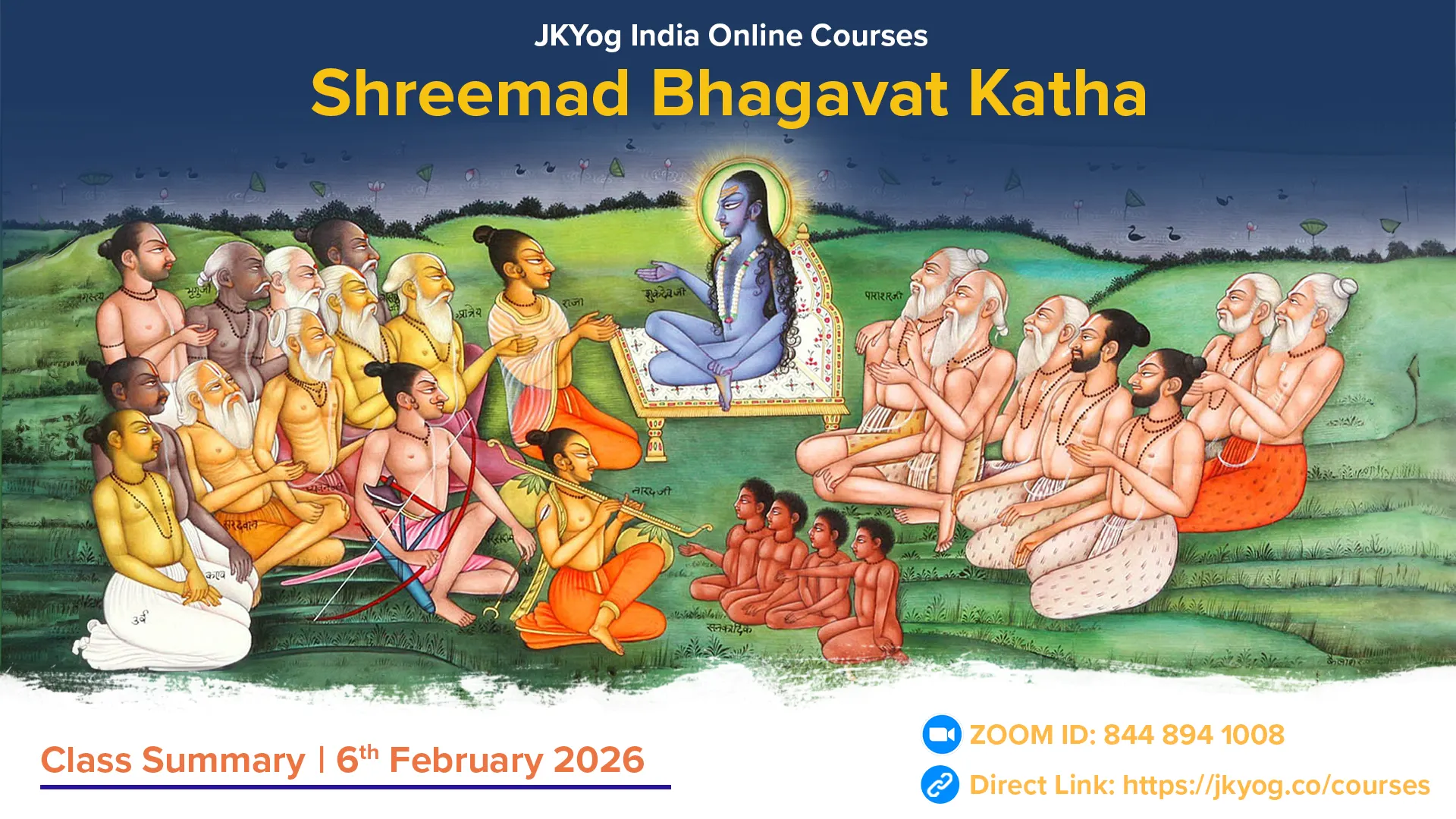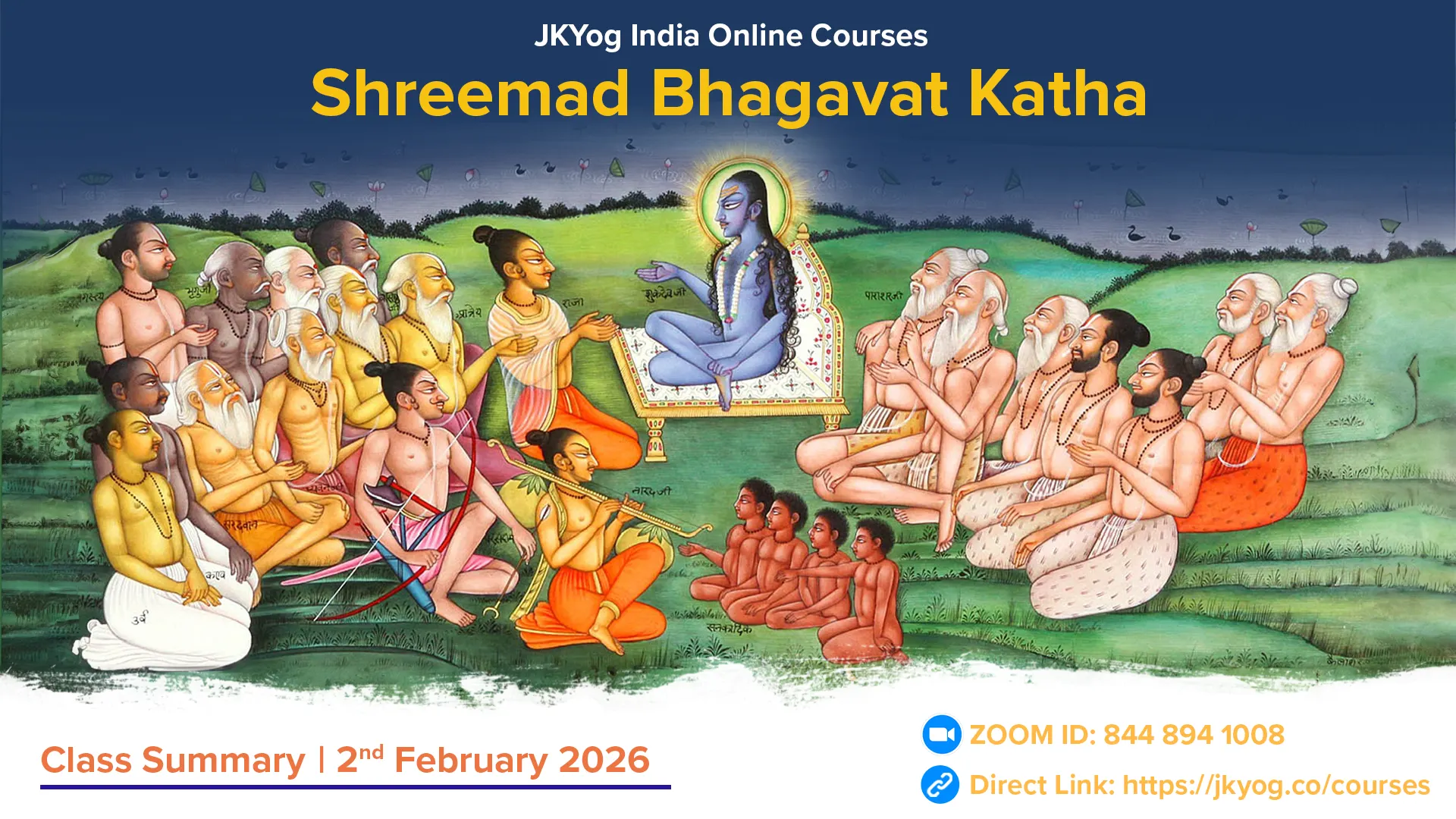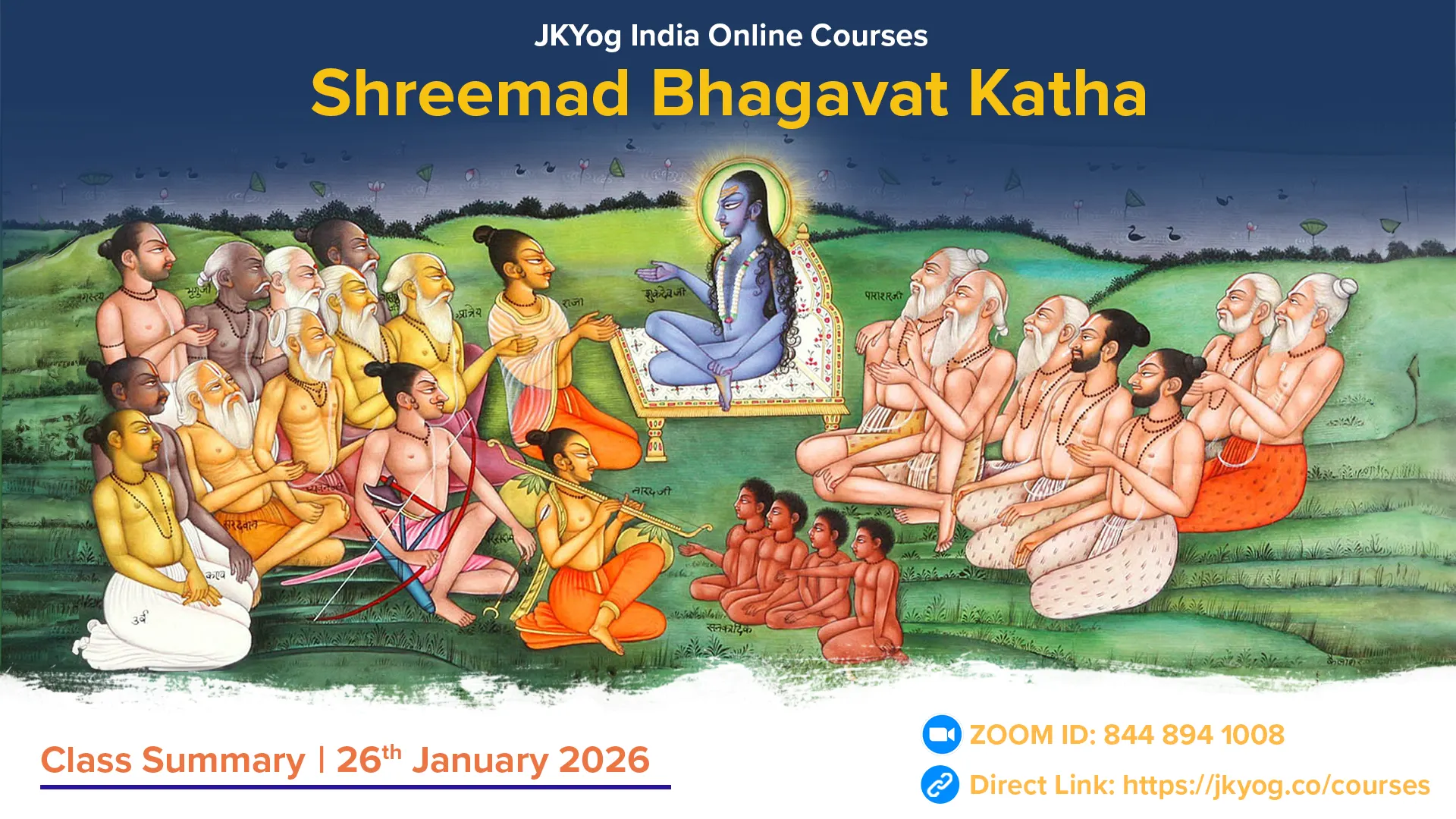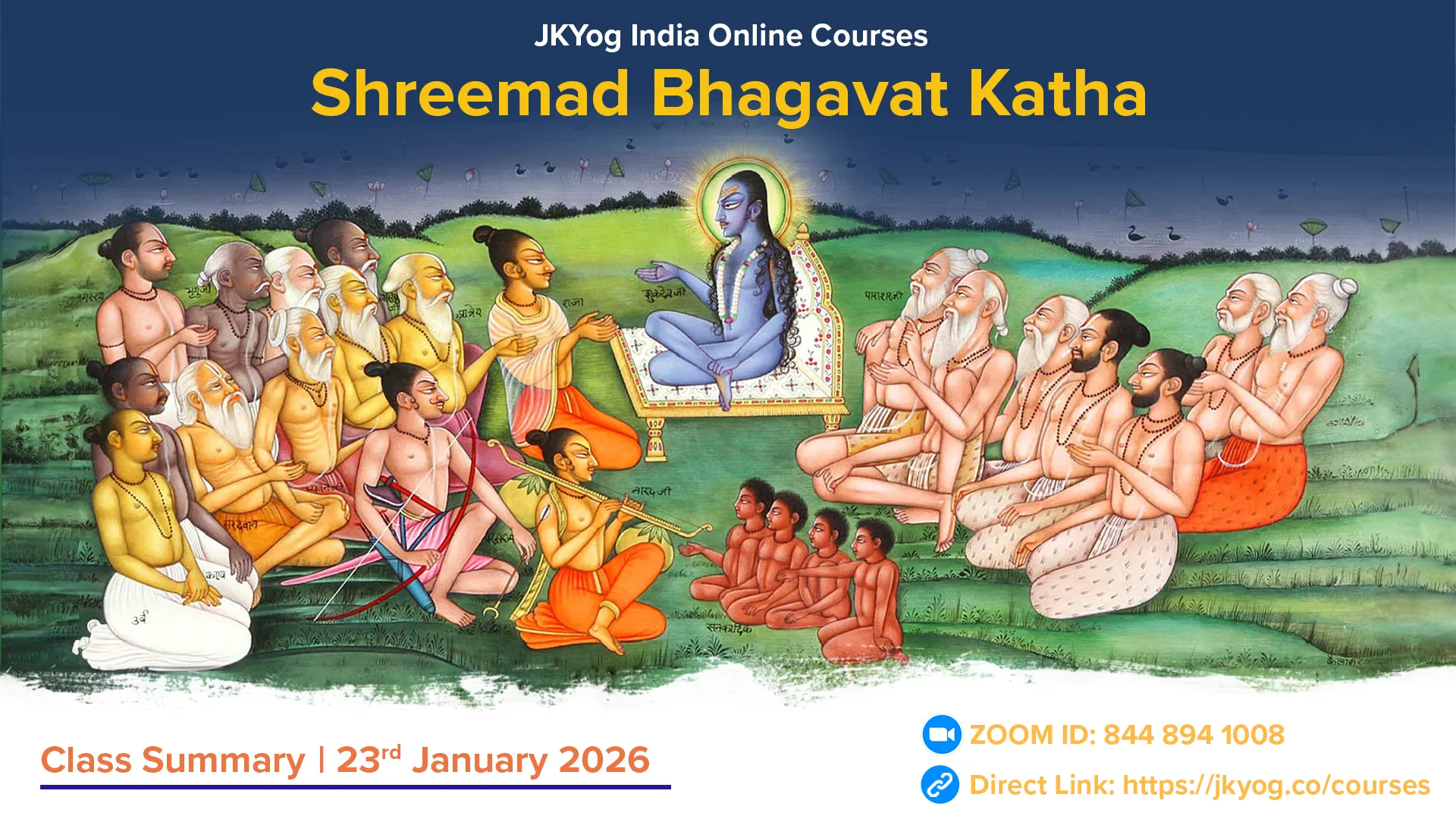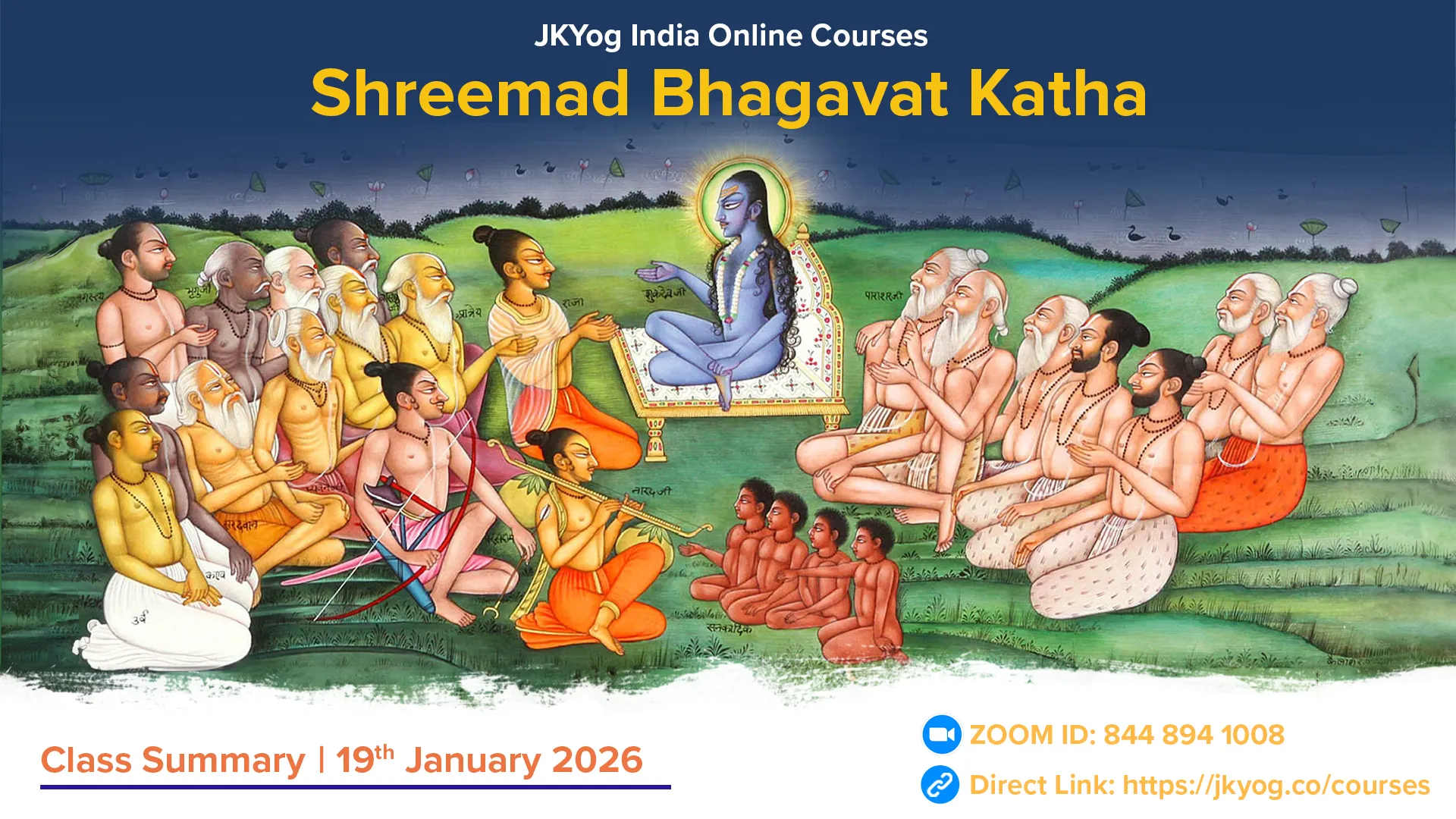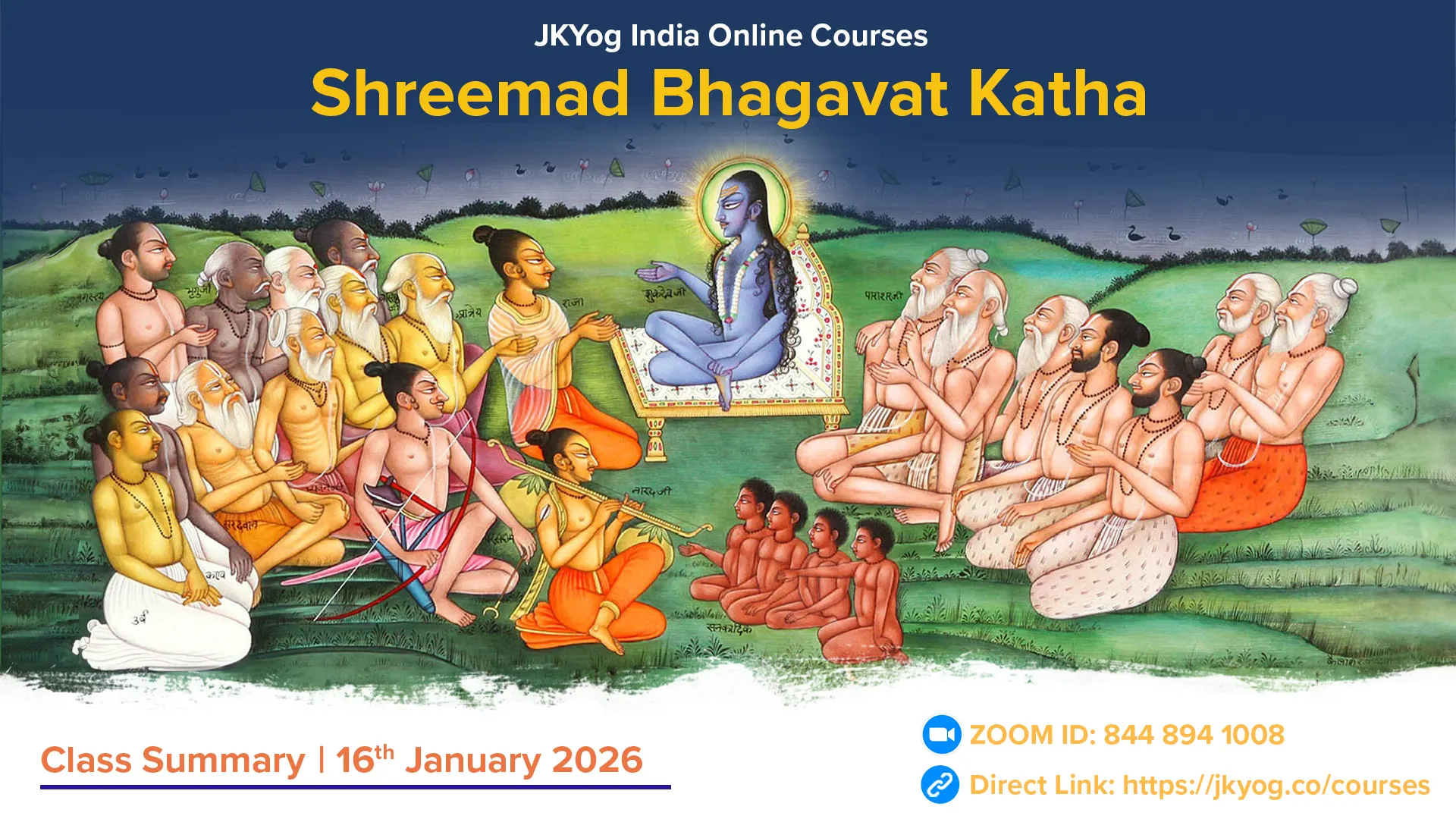Shreemad Bhagavat Mahapuran- Canto: 7, Chapters: 14-15
King Yudhishthir once asked Devarshi Naradji, “How can an ordinary householder attain God without intense austerities or difficult spiritual practices?”
Naradji replied:
“Even while living as a householder, one should perform all duties with the feeling of offering them to Bhagwan. One should seek the company and service of saints and noble souls. Keep listening to the divine pastimes (leelas) of Bhagwan’s incarnations. Just as the illusion of a dream vanishes when one wakes up, similarly, through satsang (association with saints), worldly attachments gradually fade—attachments to the body, spouse, children, wealth, etc. Outwardly, one may live like an ordinary householder, but inwardly, one should maintain detachment.
Whatever wealth or possessions one receives should be seen as prasad (divine gift) from Bhagwan, and used accordingly—not hoarded, but spent in the service of saints and for acts of devotion.”
yavad bhriyet jatharam taavat swatvam hi dehinaam
adhikam yo abhimanyeta sa steno dandam arhati
Human beings have a rightful claim only to as much wealth as is necessary to satisfy their hunger. One who considers anything beyond that as his own is a thief and deserves to be punished. (Bhagavat 7.14.8)
A householder should not toil excessively for Dharma (righteousness), Artha (wealth), and Kama (desires), but should lead life with contentment, accepting whatever is readily available according to one's place, time, and destiny (Prarabdha). Whatever material enjoyments he possesses should be shared with all living beings.
Naradji also reminds everyone of the mortal nature of the body—it will ultimately become a pile of worms, excrement, or ashes. Such a fleeting, perishable body and its cravings cannot be compared with the infinite, self-effulgent Bhagwan.
A householder should eat only the remnants of the Pancha Yajnas (the five daily offerings) and worship the deities, sages, ancestors, guests, and the Self. All of these forms of worship are, in essence, reverence of the One Supreme Bhagwan in His different aspects.
Naradji explains that offering Shraddha (rites for ancestors) and other virtuous deeds during sacred times, such as Mahalay, Eclipse, Ekadashi, Akshaya Tritiya, Magh Saptami, Purnima, etc., yields eternal merit (Akshaya Phala). When such deeds are performed in the presence of a worthy recipient, the deity’s image, sacred rivers like Ganga, and ascetic Brahmins, the fruits of such actions multiply a thousandfold.
Regarding who is the truly worthy recipient (Satpatra), Naradji affirms that wise and discerning people have considered Bhagwan Shree Krishna alone as the ultimate worthy recipient, for He is the very foundation of the entire moving and unmoving universe. Even in this Rajsuya Yajna (of Yudhishthir), despite the presence of gods and sages, it was Shree Krishna alone who was chosen for Agryapujan (chief honour), for He is the root of the cosmic tree and resides within all beings as the inner Self (Antaryami).
The human body is superior to all other species because it holds the full potential for self-realisation and attaining Bhagwan. Shree Krishna is the creator of all bodies and rests within them as the soul; therefore, He is called Purusha (the Supreme Person). Although He is unchanging and homogeneous in essence, due to the diversity of bodies and means (sadhanas), His presence is revealed in varying degrees.
In the earlier Yugs like Treta Yug, when sages observed that humans began disrespecting and dishonouring each other, they consecrated deity images to aid in Upasana (devotional worship). Even today, many people worship Bhagwan in images (murtis) with faith and devotion. However, those whose hearts harbour hatred cannot attain spiritual success, even if they engage in idol worship.
The Five Branches of Adharma (Unrighteousness)
Naradji explains that rites like Shraddha and Deva Puja yield eternal merit (Akshaya Phala) only when offerings are made with devotion to a Brahmin who is steadfast in knowledge or Yogic practice. One should not make Shraddha an elaborate affair but rather perform it simply and sincerely with pure, nonviolent offerings (Havishya-anna) appropriate to the time, place, and recipient. A person who understands Dharma should take care not to cause harm to any living being, whether by mind, speech, or action. One must especially avoid offerings that involve meat. This is true Dharma—to live with compassion, purity, and discernment, avoiding the five branches of Adharma, which are implicitly counter to these ideals.
Vidharmah paradharmash cha abhasa upama chhalah
Adharmashakhah panchema dharmajno adharmavat tyajet
There are five branches of Adharma—Vidharm, Paradharm, Abhas, Upama, and Chhal. A person who understands true Dharma should renounce these five just as he would abandon Adharma itself. (Bhagavat 7.15.12)
Dharmabadho vidharmah syat paradharmo anyachoditah
Upadharmas tu pakhando dambho va shabdabhichchalah
Any action—even if done thinking it is religious—that actually obstructs or violates true Dharma is called Vidharm. Dharma taught or prescribed by one person for someone for whom it is not meant—that is, not aligned with their stage of life (Ashram) or nature (Swabhav)—is Paradharm. Actions motivated by hypocrisy or showiness (Pakhand, Dambh) are Upadharm or Upama. It appears religious outwardly but lacks inner sincerity and truth. To distort the meaning of scriptural statements for selfish or deceptive purposes is Chhal—manipulating divine words for hidden agendas. (Bhagavat 7.15.13)
Yas tvichchhaya kritah pumbhir abhaso hy ashramat prithak
Svabhava-vihito dharmah kasya neshtah prashantaye
When a person, out of personal desire, adopts a form of Dharma contrary to his own prescribed Ashram (stage in life), it is an Abhas—a false appearance of Dharma. But the Dharma that arises from one’s natural disposition (Swabhav) and appropriate duties of one’s Varna and Ashram always leads to inner peace (Prashanti) and is never unwelcome. (Bhagavat 7.15.14)
Contentment Brings True Joy and Peace
A person who is inwardly withdrawn (Nivritti-parayan) finds true happiness through self-rooted contentment(Atmanishtha Santosh). But one who chases after greed and endless desires can never experience this peace.
Sada santushta-manasah sarvah shivamaya dishah
Sharkara-kantakadibhyah yathopanat-padah shivam
Just as a person wearing shoes fears neither stones nor thorns on the road,
one whose mind is always content sees only auspiciousness (Shivamaya) in all directions. For such a person, there is no sorrow anywhere—only peace and happiness. (Bhagavat 7.15.17)
Naradji wonders:
Why is it that a human being cannot simply sustain life with water alone and be content? Instead, driven by the cravings of the tongue and the reproductive organs, he becomes like a helpless guard dog, ever watchful over his home. One who lacks contentment, due to the greed of the senses, gradually loses his brilliance, wisdom, austerity, and fame, and even his discernment fades away.
Once hunger and thirst are quenched, the desire to eat and drink naturally ends. Even anger, after expressing itself, comes to rest. But greed is such that even if a person conquers and enjoys all the directions of the earth, it still knows no end.
Even great scholars — masters of many fields of knowledge, those who resolve doubts and expound the true meaning of scriptures in learned assemblies — they too fall from their heights due to dissatisfaction. To purify and quiet the mind, one must gain victory over the following:
- Lust (Kaam): When we renounce desires (mental projections), lust diminishes.
- Anger (Krodh): When there are no desires, there is no frustration, and hence, no anger.
- Greed (Lobh): When we regard wealth, which the world calls artha, as anartha (a cause of ruin), greed dissolves.
- Fear (Bhaya): When we are established in Tattva-jnana (realisation of the Self and the Divine), there remains nothing to fear.
In addition:
- Sorrow and delusion can be conquered through spiritual knowledge (Atmavidya).
- Hypocrisy and pride can be dissolved through the service of saints and sages.
- Restlessness of the mind can be calmed through the practice of silence.
- Violent tendencies can be overcome by stilling the body and breath.
Victory over the three types of suffering:
- Adhibhautika (pains from body, family, society) can be overcome with compassion.
- Adhidaivika (natural calamities, planetary effects) can be pacified through deep meditation (samadhi).
- Adhyatmika (inner restlessness, spiritual disconnection) can be conquered by the power of Yog.
Even sleep, which is often involuntary, can be regulated with sattvic food, a calm environment, and noble company. Through sattvaguna (mode of purity), one can overcome rajas (passion) and tamas (inertia). And then, through withdrawal (uparama) or dispassion (vairagya), even sattva is transcended.
All this becomes easy through devotion to the Guru. The Guru shows the seeker a gentle and accessible path by which these conquests of the inner world become not only possible, but natural.
yasya sakshad bhagavati jnana-deepa-prade gurau
martyasaddhih shrutam tasya sarvam kunjara-shauchavat
One who regards the Guru—who is the very manifestation of Bhagwan and the one who illumines the intellect with divine knowledge—as a mere mortal, renders all his scriptural study and listening fruitless, like the bath of an elephant that soils itself again. (Bhagavat 7.15.26)
esha vai bhagavan sakshat pradhana-purushe-shvarah
yogeshvarair vimrigyanghrir loko yam manyate naram
The Guru is verily God Himself— the Supreme Lord of both Prakriti (primordial nature) and Purush (the cosmic soul). His lotus feet are sought after by even the greatest Yogeshwars. Yet, the deluded world mistakes Him to be a mere human being. (Bhagavat 7.15.27)
All the rules prescribed in the scriptures have one essential purpose: to help us conquer our six internal enemies—lust, anger, greed, attachment, pride, and jealousy —and to bring the mind and senses under control. If, despite following these disciplines, the mind does not remain absorbed in thoughts of God, then such practices amount to nothing more than empty ritual and wasted effort.
A true spiritual seeker is one who renounces worldly attachments and possessions, takes authentic Sanyas, lives in solitude, practises moderation in food, sits in stillness, chants Om, and repeatedly draws the restless mind back into the heart centre. Through such consistent practice, the mind gradually quiets down, just as fire dies out when its fuel is exhausted. Eventually, it becomes fully absorbed in the bliss of the Absolute (Brahmanand).
But one who takes the outer garb of Sanyas and then returns to indulgence in worldly pleasures is like a dog returning to eat its own vomit—a symbol of extreme hypocrisy and spiritual downfall. Regardless of whether one is a householder (grihastha), celibate student (brahmachari), forest-dweller (vanaprasthi), or renunciate (Sanyasi), if one neglects one's duties and remains entangled in sense gratification, one only dishonours the sanctity of the ashram system.
In the Upanishads, it is said:
This body is a chariot, the senses are the horses, and the mind, which controls the senses, is the reins. The paths of the senses, such as sound and other sense objects, are the roads. Intellect (buddhi) is the charioteer, and the chitta(consciousness) is the vast rope woven by Bhagwan to bind the being to this world. The ten pranas are the axles, and Dharma and Adharma are the wheels. The jiva, identifying with all of these, is called the charioteer (rathi).
The syllable Om is the bow, the pure soul (shuddha jivatma) is the arrow, and the Supreme Being (Paramatma) is the target. (One should merge the inner self into the Supreme using this bow of Om.)
Rago dveshash cha lobhash cha shoka-mohau bhayam madah
mano-vamano-suya cha maya hinsa cha matsarah
rajah pramadah kshunnidra shatravas tyevamadayah
rajas-tamah-prakritayah sattva-prakritayah kvachit
Desire, hatred, greed, sorrow, delusion, fear, arrogance, pride, insult, fault-finding, deceit, violence, envy of others’ success, craving, heedlessness, hunger, and sleep are just some of the enemies of the soul. Most of them arise from the modes of rajas and tamas, though a few may at times appear under the influence of sattva.
As long as this chariot of the human body remains under control, and its instruments—mind, senses, and intellect—stay in good condition, the seeker should, through devoted service to the lotus feet of the Guru, pick up the razor-sharp sword of knowledge and, taking refuge in Bhagwan, destroy these enemies. Then, seated on the throne of self-mastery, he should eventually abandon the body in a state of profound inner peace.
But if there is even the slightest carelessness, the wicked horses of the senses and the intellect, which has befriended them, will carry the soul off-track. They will lead the charioteer down the wrong path and throw him into the hands of sense-robbers. These bandits, along with the misguided horses and charioteer, will push the soul into the fearsome, pitch-dark well of worldly existence—the cycle of death and rebirth.
Pravrittam cha nivrittam cha dvividham karma vaidikam
Avartate pravrittena nivrittena ashnute amritam
Vedic actions (karma) are of two types — those that direct the mind and senses outward towards their objects are called pravritti-parak (extroverted actions), and those that withdraw the mind from external objects, leading it to stillness and readiness for self-realisation, are nivritti-parak (introverted actions). The path of pravritti leads to repeated cycles of birth and death, while the path of nivritti, through devotion (bhakti marg) or knowledge (jnana marg), leads to the attainment of the Supreme Being (Paramatma). (Bhagavat 7.15.47)
A person devoted to pravritti (i.e., one engaged in desire-driven action) takes on a subtle body after death and travels the path of smoke (dhoom-marg) to reach the lunar realm (Chandralok). There, after exhausting the fruits of past virtuous deeds through enjoyment, the soul declines in merit and eventually returns to Earth via the ancestral path (pitri-yaan) to take birth again in the cycle of samsara.
In contrast, a person devoted to nivritti (the path of knowledge and renunciation) offers all external sacrifices into the fire of inner control—sacrificing the senses, mind, life-force, and ultimately even the sacred syllable Om—merging them all into Brahman. Such a soul travels the path of the gods (dev-yaan) and attains Brahma-lok, the highest celestial realm. There, after transcending all enjoyment, the soul gradually dissolves into subtler states: Vishva (waking), Tejas (dream), Prajna (deep sleep), and finally becomes established in the Turiya state—the state of pure consciousness. This is true liberation (moksha). One who follows this path does not return to the cycle of rebirth.
Pitṛ-yāna and devayāna are the two paths of departure described in the Vedas. One who truly understands their inner significance, as explained in the scripture, becomes free from delusion even while living in the body.
The non-dual (advaita) experience has three dimensions:
- Bhava-advaita: All objects and experiences are various expressions of a single underlying essence or feeling.
- Kriya-advaita: All actions and movements are taking place in and through the Divine; they are sustained by and dissolved in Him.
- Dravya-advaita: All beings and substances are essentially part of the same Supreme Reality, with no real division.
A devotee of God can attain Krishna’s grace and ultimate destination even while living a householder’s life, by performing Vedic duties and selfless action in the spirit of devotion. Just like Yudhishthir and the Pandavas, who, through Shree Krishna’s grace, overcame immense challenges and conducted great yajnas like the Rājasūya, one can achieve the highest spiritual progress while being grounded in Dharma.
Naradji’s Previous Birth as a Gandharva
Naradji once said to Yudhishthir:
"O Yudhishthir! In a previous Mahakalpa, I was a Gandharva named Upabarhan. Among the Gandharvas, I was highly respected. I possessed extraordinary beauty, grace, and sweetness. My body naturally emitted fragrance, and my presence was captivating. Women were enamoured by me, and I remained constantly indulged in pleasures and vanity.
One day, a sacred assembly of sages and deities was organised, where the divine pastimes of God were to be sung. The great Prajapatis had gathered, and Gandharvas and Apsaras were invited to perform. Though I was well aware of the sanctity of the event and that it was meant for kirtan of Bhagwan’s leela, I arrogantly entered the divine sabha, intoxicated and surrounded by women, singing worldly songs.
The gods felt deeply disrespected by my behaviour. With their yogic powers, they cursed me, ‘Since you have dishonoured this sacred assembly, your divine beauty and all your splendour will be stripped away. You shall be born into a lowly birth by worldly standards.’
By the power of their curse, I was born as the son of a maidservant. But even in that humble birth, I had the good fortune of serving and listening to great saints. Their association and blessings transformed my heart. Due to this spiritual merit, I was born again as the mind-born son of Brahma, and became known as Devarshi Narad."
Naradji continued with deep emotion:
"O King! I have personally experienced both the fall that comes from dishonouring saints and the grace that flows from serving them with devotion. Even a householder who lives with bhakti and service can attain the same supreme state that a renunciate achieves through Sanyas.
You are truly blessed, Yudhishthir, for the Supreme Bhagwan Shree Krishna Himself resides in your home!
The One whom even Brahma and Shankar cannot fully comprehend, He is your friend, your relative, and the deity you worship.
We, on the other hand, worship Him through silence, devotion, and restraint—yet it is you whom He has chosen and accepted!"
Shukadevji concludes the Seventh Canto of Shreemad Bhagavatam by saying, "O Parikshit! When Yudhishthir heard this profound and divine discourse from Naradji, his heart was overwhelmed with bhakti and reverence. With deep love, he worshipped both Naradji and Shree Krishna. Afterwards, Naradji took respectful leave from them and departed.
Thus, I have narrated to you the glorious lineage of Daksha’s daughters, from whom arose gods, demons, humans, and all of creation."
Summary: JKYog India Online Class- Shreemad Bhagavat Katha [Hindi]- 26.05.2025

